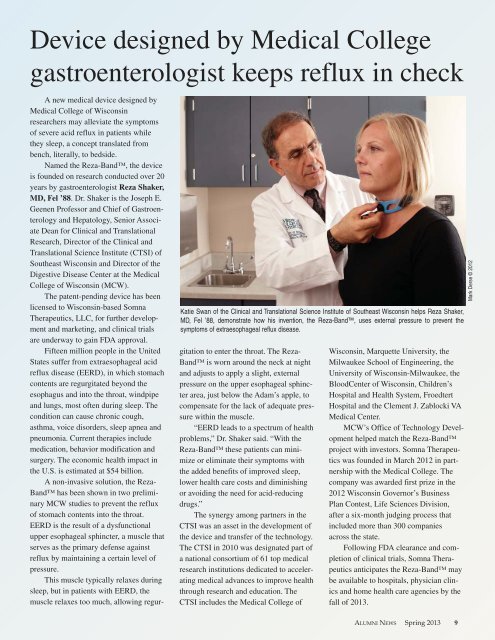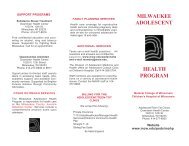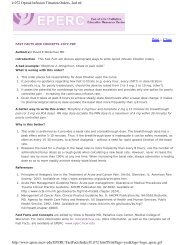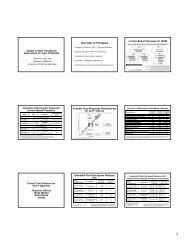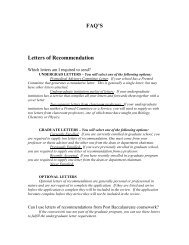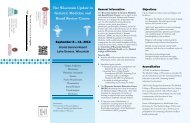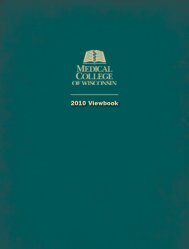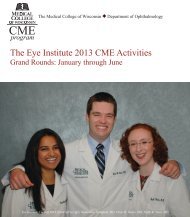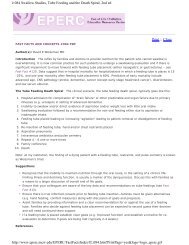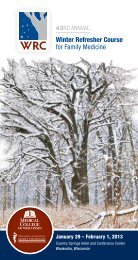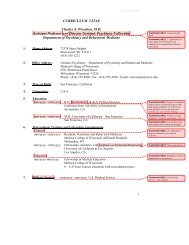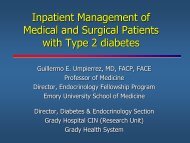Spring 2013 issue (pdf) - Medical College of Wisconsin
Spring 2013 issue (pdf) - Medical College of Wisconsin
Spring 2013 issue (pdf) - Medical College of Wisconsin
Create successful ePaper yourself
Turn your PDF publications into a flip-book with our unique Google optimized e-Paper software.
Device designed by <strong>Medical</strong> <strong>College</strong><br />
gastroenterologist keeps reflux in check<br />
Katie Swan <strong>of</strong> the Clinical and Translational Science Institute <strong>of</strong> Southeast <strong>Wisconsin</strong> helps Reza Shaker,<br />
MD, Fel ’88, demonstrate how his invention, the Reza-Band, uses external pressure to prevent the<br />
symptoms <strong>of</strong> extraesophageal reflux disease.<br />
A new medical device designed by<br />
<strong>Medical</strong> <strong>College</strong> <strong>of</strong> <strong>Wisconsin</strong><br />
researchers may alleviate the symptoms<br />
<strong>of</strong> severe acid reflux in patients while<br />
they sleep, a concept translated from<br />
bench, literally, to bedside.<br />
Named the Reza-Band, the device<br />
is founded on research conducted over 20<br />
years by gastroenterologist Reza Shaker,<br />
MD, Fel ’88. Dr. Shaker is the Joseph E.<br />
Geenen Pr<strong>of</strong>essor and Chief <strong>of</strong> Gastroenterology<br />
and Hepatology, Senior Associate<br />
Dean for Clinical and Translational<br />
Research, Director <strong>of</strong> the Clinical and<br />
Translational Science Institute (CTSI) <strong>of</strong><br />
Southeast <strong>Wisconsin</strong> and Director <strong>of</strong> the<br />
Digestive Disease Center at the <strong>Medical</strong><br />
<strong>College</strong> <strong>of</strong> <strong>Wisconsin</strong> (MCW).<br />
The patent-pending device has been<br />
licensed to <strong>Wisconsin</strong>-based Somna<br />
Therapeutics, LLC, for further development<br />
and marketing, and clinical trials<br />
are underway to gain FDA approval.<br />
Fifteen million people in the United<br />
States suffer from extraesophageal acid<br />
reflux disease (EERD), in which stomach<br />
contents are regurgitated beyond the<br />
esophagus and into the throat, windpipe<br />
and lungs, most <strong>of</strong>ten during sleep. The<br />
condition can cause chronic cough,<br />
asthma, voice disorders, sleep apnea and<br />
pneumonia. Current therapies include<br />
medication, behavior modification and<br />
surgery. The economic health impact in<br />
the U.S. is estimated at $54 billion.<br />
A non-invasive solution, the Reza-<br />
Band has been shown in two preliminary<br />
MCW studies to prevent the reflux<br />
<strong>of</strong> stomach contents into the throat.<br />
EERD is the result <strong>of</strong> a dysfunctional<br />
upper esophageal sphincter, a muscle that<br />
serves as the primary defense against<br />
reflux by maintaining a certain level <strong>of</strong><br />
pressure.<br />
This muscle typically relaxes during<br />
sleep, but in patients with EERD, the<br />
muscle relaxes too much, allowing regurgitation<br />
to enter the throat. The Reza-<br />
Band is worn around the neck at night<br />
and adjusts to apply a slight, external<br />
pressure on the upper esophageal sphincter<br />
area, just below the Adam’s apple, to<br />
compensate for the lack <strong>of</strong> adequate pressure<br />
within the muscle.<br />
“EERD leads to a spectrum <strong>of</strong> health<br />
problems,” Dr. Shaker said. “With the<br />
Reza-Band these patients can minimize<br />
or eliminate their symptoms with<br />
the added benefits <strong>of</strong> improved sleep,<br />
lower health care costs and diminishing<br />
or avoiding the need for acid-reducing<br />
drugs.”<br />
The synergy among partners in the<br />
CTSI was an asset in the development <strong>of</strong><br />
the device and transfer <strong>of</strong> the technology.<br />
The CTSI in 2010 was designated part <strong>of</strong><br />
a national consortium <strong>of</strong> 61 top medical<br />
research institutions dedicated to accelerating<br />
medical advances to improve health<br />
through research and education. The<br />
CTSI includes the <strong>Medical</strong> <strong>College</strong> <strong>of</strong><br />
<strong>Wisconsin</strong>, Marquette University, the<br />
Milwaukee School <strong>of</strong> Engineering, the<br />
University <strong>of</strong> <strong>Wisconsin</strong>-Milwaukee, the<br />
BloodCenter <strong>of</strong> <strong>Wisconsin</strong>, Children’s<br />
Hospital and Health System, Froedtert<br />
Hospital and the Clement J. Zablocki VA<br />
<strong>Medical</strong> Center.<br />
MCW’s Office <strong>of</strong> Technology Development<br />
helped match the Reza-Band<br />
project with investors. Somna Therapeutics<br />
was founded in March 2012 in partnership<br />
with the <strong>Medical</strong> <strong>College</strong>. The<br />
company was awarded first prize in the<br />
2012 <strong>Wisconsin</strong> Governor’s Business<br />
Plan Contest, Life Sciences Division,<br />
after a six-month judging process that<br />
included more than 300 companies<br />
across the state.<br />
Following FDA clearance and completion<br />
<strong>of</strong> clinical trials, Somna Therapeutics<br />
anticipates the Reza-Band may<br />
be available to hospitals, physician clinics<br />
and home health care agencies by the<br />
fall <strong>of</strong> <strong>2013</strong>.<br />
Mark Derse © 2012<br />
ALUMNI NEWS <strong>Spring</strong> <strong>2013</strong> 9


